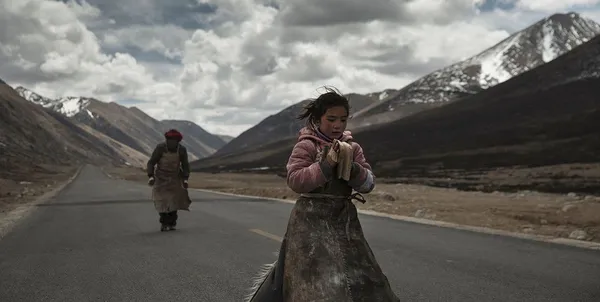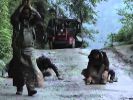Eye For Film >> Movies >> Paths Of The Soul (2015) Film Review
Paths Of The Soul
Reviewed by: Amber Wilkinson

Road movies are a staple of cinema but they are rarely as breathtaking, immersive and intense as Zhang Yang's fascinating docu-fiction hybrid. The director 'cast' a group of Tibetan villagers who were planning the traditional Buddhist pilgrimage to Lhasa - a sort of once-in-a-lifetime act of devotion akin to the Islamic Hajj - and structured a lose narrative around their incredible 1,200-mile journey.
The reason it is incredible is not simply because of the distance - although it's worth noting that this is a major feat in itself, given the fact that it involves scaling any number of mountains in all weathers - but because of the very specific manner in which this sort of pilgrimage must be conducted, with each person kow-towing once every 10 feet. In the West, the term kow-towing has become synonymous with tugging your forlock, but the truth of the action is considerably more physically intense.

Armed with pre-prepared animal hide full-frontal aprons and with carefully cut wooden blocks on each hand - not unlike thick flip-flops - each of the pilgrims prays constantly, clapping the blocks together and, around every six or seven feet, flings themselves forward so they 'surf' face down along the ground, quickly getting up before beginning the ritual again. Even once, this seems an unbelievable physical and mental effort - an idea which becomes almost mind-boggling when you consider the pilgrims repeat the action every few steps of their entire journey.
The other thing to note about the pilgrimage is that age and physical state are barely considered as barriers. One of the women on the pilgrimage (Tsring Chodron) is heavily pregnant and although taking a brief breather on the supply-packed tractor that accompanies their trek when she first gives birth, is soon back with the others in their prostrate devotion, while another, Gyatso (Gyatso), is just a little girl. "It's to pray, not to play," someone tells them along the way, but in fact Gyatso proves to be considerably more diligent than some of the adults around her, her youthful dedication giving them a renewed energy.
Yang takes his time and simply drinks in the wonder of all this, the percussive and rhythmic act of the group's devotion acting as a meditation for the viewer as we relax into the hypnotic rhythm, at once contemplating their spirituality while also being prompted to consider our own. Cinematographer Guo Daming frequently pulls back to give us a sense of the moutainous landscape and the way it changes from dusty to lush to sodden, while the group simply keeps on going.
The quiet dedication of the group and Yabg's unhurried approach allow time for the details to sink in and give a real sense of the sense of the seasons turning as the pilgrims make progress. Whether it is the clatter of stones cascading down the mountain while the group continue their prayer cycle without thought of life and limb, the intrusion - and danger - of modern life in the shape of trucks that clatter past them on the road or the simplicity of a bunting and paper celebration, everything takes on a contemplative weight.
This would be enough on its own to recommend the film, but Yang also creates a gradual narrative arc, showing how the pilgrims interact with others on the road and building a slow crescendo that takes in birth, death and even the possibility of failure. This is slow cinema at its finest.
Reviewed on: 23 Feb 2016














